After leading design teams at Code and Theory, ABC News and Newsweek Digital, Mark Forscher retired his managerial hat and decided to start his own creative studio called Under After in 2008. His natural interest in technology coupled with his background in branding and product design makes him an obvious collaborator for founders looking to launch their company. We talked to him about his creative process, some of his favorite branding projects and more.
Mark’s branding philosophy:
“I understand that it can be a challenge for founders to make definitive decisions around picking a logo or picking a color palette. It feels very concrete when a lot of product is about finding the right product/market fit, iterating, testing and using data to inform the process. So wherever possible, I try to bring that kind of iterative philosophy into the branding approach as well, which tends to work pretty well with founders, especially technology founders.”
On remaining independent:
“The reason why I haven’t scaled up my design business, why I’m not trying to be like a 10-person shop, or even a five-person shop, is because I want to be a collaborator, not a vendor that somebody outsources work to. I think it sets the expectation right upfront that we’re both in this together to figure this out. I’m just a person deeply committed to working with the founder.”
On common startup branding mistakes:
“I think one of the biggest things that impacts the success of a branding project is not investing time into it. Sometimes founders think that if they just throw money at a problem, it’ll get solved, and I think they underestimate the amount of time that’s required. It’s not that it takes an extensive amount of time, but their thoughtful feedback at every point in the process is important, and small decisions build up to big ones. It’s hard to do that if the founder’s super busy, and oftentimes founders are busy. Prioritizing that work is important.”
“Incredible brand identity and brand systems design. Thoughtful product strategy and UX design. Truly magical at taking hard concepts and making them easy to understand. A CEO & founder in NYC
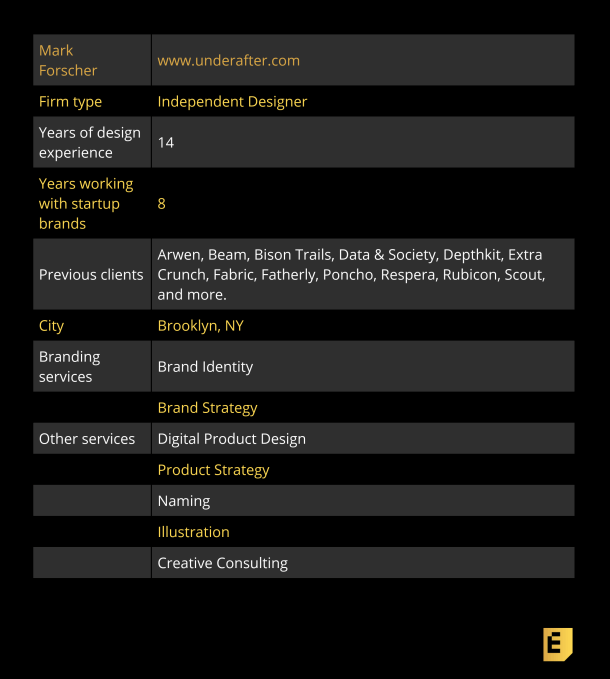
Below, you’ll find the rest of the founder reviews, the full interview and more details like pricing and fee structures. This profile is part of our ongoing series covering startup brand designers and agencies with whom founders love to work, based on this survey and our own research. The survey is open indefinitely, so please fill it out if you haven’t already.
The Interview
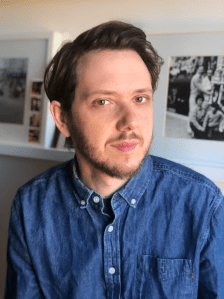
Yvonne Leow: Can you tell me a little bit about how you got started in design and what particularly drew you to branding?
Mark Forscher: I’ve been working in design professionally since 2004. I was at R/GA while I was in grad school, worked on the Nike basketball account, and after finishing an MFA degree at Parsons, I joined Code and Theory. I was one of Code and Theory’s early hires, I think I was the 6th or 7th employee, and was quickly promoted to be their first official creative director. So I learned a lot about how to run large-scale digital projects, from definition, UX, design, to project management. I really liked working directly with clients to understand their needs, and to create impactful work.
After Code and Theory, I wanted to work in-house at a media company because I wanted to build digital projects and create longer-term value instead of a single engagement on a contract basis. I was really interested in doing work in the service of good editorial content.
I was fortunate to be hired at Newsweek Digital as their creative director. This was before the merger with the Daily Beast, and before Newsweek was sold for a dollar to the Harman family. I learned a lot from the digital team and after that, I worked in-house at ABC News as their digital creative director. This was a great job on paper, but it was much more managerial than focused on improving the digital products, user experience or working on launching new brands. I realized I was spending too much time away from what I wanted to be doing, which was growing my skills as a designer, so I went independent in 2011. I didn’t have an actual client at the time, but I felt like I had a fairly decent network in New York, and I really wanted to be spending time adding value. I realized a good way of doing that was by working with startups.
At first, I was focused on UX and product because that was more of my experience. I intentionally stayed away from working with more established brands. I realized pretty quickly that I was motivated by working with people who had taken a big leap to put something into the world and who really had skin in the game. If they could sell me on their vision, I was hooked, especially if they had traction with customers and investors.
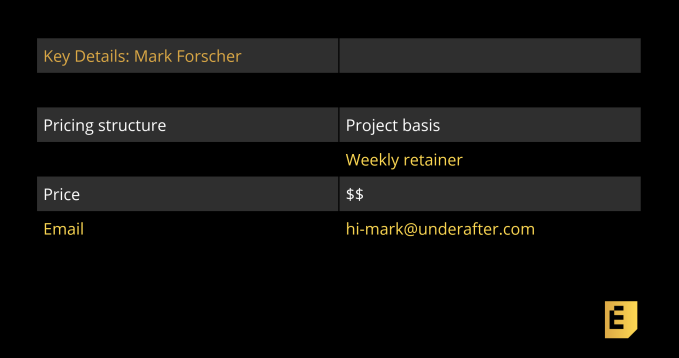
I started focusing more on brand work in the past five years or so, and now my portfolio reflects that pretty much exclusively. I shifted to brand work because I’ve seen a lot of projects where a year is spent building something and then it doesn’t end up connecting with users. So I felt like brand was a good way to add a lot of value with my time, and to really be involved in the early strategic conversations with founders to understand what they’re trying to do, who they’re trying to reach with the product or service and also help them make that idea a reality. That’s the part I get really excited about.
Yvonne Leow: That’s terrific. What do you enjoy about working with startups? What have you learned from working with them in the past five years?
Mark Forscher: I like bringing creative ideas to life. I like learning new things in new spaces. Once I understand a vision, I can really get behind it, and that’s what motivates me. I also like adding value with my time and doing brand work is one of the best ways as an individual that I can add a lot of value that can hopefully last for a long time for the companies that I work with.
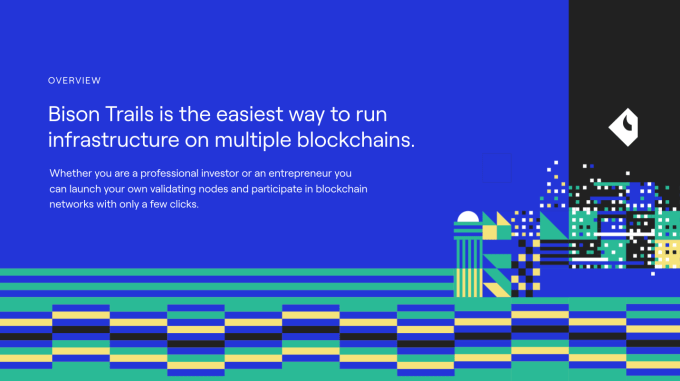
I think having a product design background helps too. I can anticipate some of their needs, both in terms of the brand and how the brand will translate into the user experience and their marketing. I also know how to wear different hats. Sometimes I play more of a product role, sometimes I do product design, but sometimes it’s just brand and I’m working closely with the founders or their team.
Yvonne Leow: Cool. Can you tell me about your favorite client project and why?
Mark Forscher: That’s tricky. I have a lot of favorite projects. There are some projects that are just fun. For instance, mascot brands are fun because mascots aren’t too common. One project I worked on was Poncho, a Betaworks company, that was launching a weather service. They knew they wanted to differentiate themselves with the brand because the weather space overall is very utilitarian. They had an idea that they wanted a mascot, and they came up with the name Poncho. At first, I was designing some mascots that looked more human, and that just didn’t work with the name. But I have a crazy little cat, so I was like, “this mascot could be a cat. And why a cat? Because cats don’t like getting wet.” So I presented it and they loved it. It connected with the personality they imagined, and after I did the initial brand, some illustrations and some of the design system, they hired a great team, including illustrators like Jaclyn Kessel who really brought it all to life.
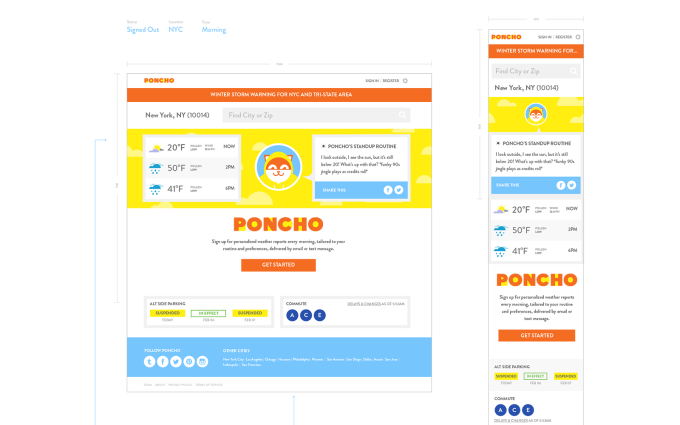
I would love to work on more mascot projects like that. And I actually worked with that founder on another: he’s doing a blockchain company now called Scout. He wanted a similar strategy a second time, a playful mascot to stand out in a more serious space, and we joked “let’s do a dog, because we did a cat last time.” My wife saw me working on the naming and visual identity and said something like, “I can’t believe your job is to come up with dog names and draw dogs.” Not every project is like that, but mascots are fun.
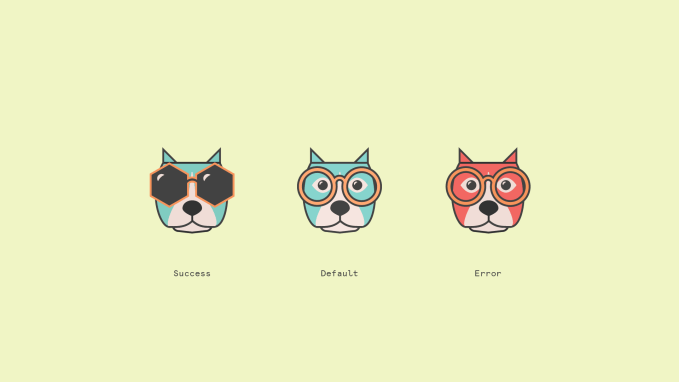
Yvonne Leow Totally. What’s your creative process like? What can founders expect when they collaborate with you?
Mark Forscher: Every project is so different because the people involved are different. My process is pretty flexible, but the overall structure is: I want to understand their needs, expectations and past experiences with other designers. The latter often informs my approach: what they liked while working with another designer and what were their pain points.
I definitely can’t create a brand without understanding the product, the people and the vision. So the first part of an engagement is a quick definition exercise, so that I understand the company, what you’re doing, why and how you work. These are all data points that provide me with some perspective on the brand. I also want to know about your values and the big ideas that inspire you because it’s all part of the company’s story and motivation for the team creating the product.
The services I provide are brand strategy, naming, visual identity, digital product design and product strategy. For the brand strategy side of it, my role is to help the team align their values, personality and brand so there’s a plan for how to position the product or service and how it’s going to connect with audiences.
I understand that it can be a challenge for founders to make definitive decisions around picking a logo or picking a color palette. It feels very concrete when a lot of product is about finding the right product/market fit, iterating, testing and using data to inform the process. So wherever possible, I try to bring that kind of iterative philosophy into the branding approach as well, which tends to work pretty well with founders, especially technology founders.
Yvonne Leow: What do you think are some of the most common mistakes you see founders make when it comes to branding?
Mark Forscher: I think one of the biggest things that impacts the success of a branding project is not investing time into it. Sometimes founders think that if they just throw money at a problem, it’ll get solved, and I think they underestimate the amount of time that’s required. It’s not that it takes an extensive amount of time, but their thoughtful feedback at every point in the process is important, and small decisions build up to big ones. It’s hard to do that if the founder is super busy, and oftentimes founders are busy. Prioritizing working with me is important if you want the brand project to go as well as possible.

Additionally, understanding upfront that if you have a team and investors who are involved, let’s be clear about roles and expectations. I think getting people’s input upfront is really important, especially if you’re going to end up providing feedback later. Ultimately, swooping in later with feedback doesn’t usually go as well. The people involved in the process have a big impact on the results.
Yvonne Leow: Totally. What kind of advice would you give to entrepreneurs who are deciding between hiring a big agency versus an independent designer?
Mark Forscher: The reason why I haven’t scaled up my design business, why I’m not trying to be like a 10-person shop or even a five-person shop, is because I want to be a collaborator, not a vendor that somebody outsources work to. I think it sets the expectation right upfront that we’re both in this together to figure this out. I’m just a person deeply committed to working with the founder. Agencies tend to have a business model which necessitates them taking on a certain number of projects, and there’s pressure to always be closing better-paying projects just to keep the lights on, which can change the nature of the work that they do.
Yvonne Leow: Last question: What’s your pricing structure?
Mark Forscher: This year, I switched to a weekly retainer structure, so I only work on two brand projects at a time and I give 20 hours a week to each project. That structure really relieves some of the headaches of managing rounds of feedback and negotiating revisions and takes some pressure off of founders.
I like to reduce risk for clients however I can, so there’s no commitment to work with me after a week. We can part ways after that first week, but if clients do like working with me, then we can keep going as long as there’s work. Sometimes a brand engagement turns into a longer product or web design project. The weekly approach really helps me focus and be collaborative. I track my hours and the breakdown of how I spend my time if clients are interested. The weekly retainer feels more natural than doing fixed-cost work, which can be more lucrative. If or when things change, it’s hard to be both a collaborator and somebody trying to manage scope.
Founder recommendations
“Incredible brand identity and brand systems design. Thoughtful product strategy and UX design. Truly magical at taking hard concepts and making them easy to understand.” – Joe Lallouz, NYC, CEO & founder, Bison Trails
“Naming exercise, positioning workshop, visual identity development, website design” – Scott Sigel, Boston, Head of Business Development at Arwen
“Mark originated and refined our skincare company’s brand identity from the ground up, designed our packaging, and helped us write and tell our story. He was able to manage four stubborn co-founders and turn our sometimes wildly different ideas and opinions into a cohesive narrative for our brand. His organizational and communication skills pace his talent as a designer and brand strategist, and I thought that his management of the entire process was critical to our initial success in a very competitive space. We’ve continued to use Mark’s branding blueprint as our company grows.” – A co-founder in NYC
“Mark designed the logo used for Extra Crunch. It took a few iterations to get where we wanted, but he was patient with us as we got to the finish line. The final result was a beautiful logo that captured our new subscription offering, but with a familiar TechCrunch twist (the chunk was taken out of the “E”, similar to what’s done with the existing “TC” logo).” – Travis Bernard, SF, Senior Director at TechCrunch
